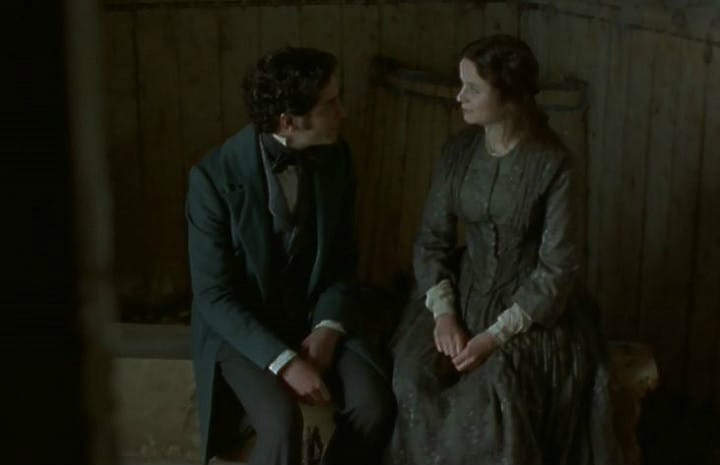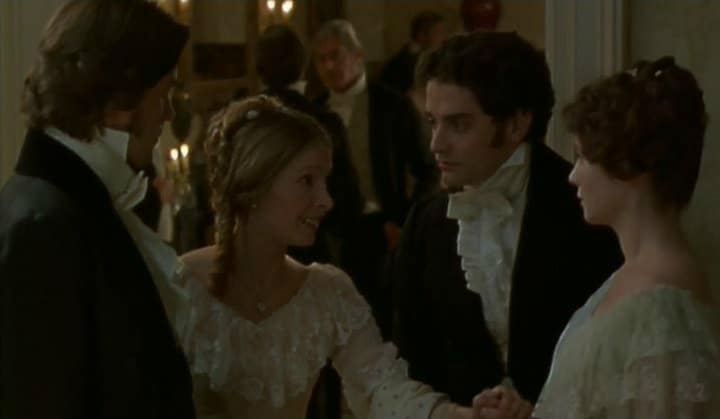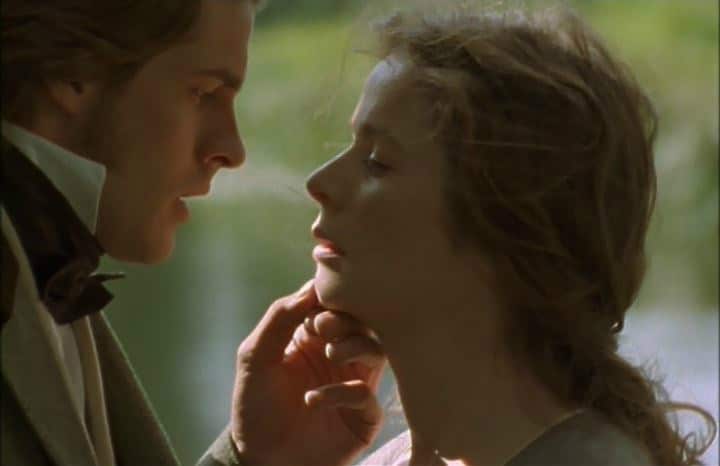
Classic Review: The Mill on the Floss (1997)
The Mill on the Floss is an adaptation of the novel by George Eliot. I have not read the book and so I cannot say if the film is a good adaptation or not. Instead, I will try to view it as its own entity. The Mill on the Floss is a frustrating picture of a young woman caught between the constricting ties of family and her desire to forge ahead to find her independence.
The Plot
Maggie Tulliver is an intelligent, passionate and non-conforming woman stifled by her life in a Victorian rural community. She has a close relationship with her cold, dutiful brother Tom whose approval she craves almost pathologically.
She seeks acceptance elsewhere and is drawn to the hunchbacked Philip, son of the man who will take everything from her family. Maggie and Philip bond over their shared passion and love of reading. However, upon discovery of this blossoming romance Tom commands her not to see him again. Things are further complicated when her beloved cousin’s fiancé Stephen, begins to develop an obsessive love for Maggie.

George Eliot supposedly drew heavily on her own childhood and relationship with her brother in writing The Mill on the Floss. This semi-autobiographical aspect of the story only serves to heighten the tragedy of it, for it is a tragedy. Half of the major characters have a fatal flaw that drives them inexorably to their doom.
In some ways, Eliot’s novel uses and then subverts the traditional structure of a bildungsroman to condemn the strictures placed on young women in Victorian society. Maggie clashes spectacularly with her brother in a particular scene. She rails against the lack of help she is to her family due to her status as a woman and the subsequent dependence she is forced into. This scene is apparently taken directly from the book and I was impressed by how modern Maggie’s sensibilities were.
RELATED POST – 50 Books To Read if you Love Jane Austen
Maggie forms the heart of this film and you will care deeply for her. This is not least of all due to the talents of Emily Watson. Already brilliant in an early role she crackles with intelligence and frustrated passion. Bernard Hill is excellent as the single-minded and increasingly bitter father of Maggie and Tom. James Frain brings a soulful and strongly sympathetic depth to Philip. It is a pity he did not get more screen time. However, I found Ifan Meredith to be a little wooden as Tom and James Weber Brown to lack any memorable qualities as Stephan Guest. However, in both cases, this may be due to the writing of the original characters rather than any fault of theirs.

The child actors Lucy Borton, Jon Lee and Stefan Weclawek who play Maggie, Tom and Philip respectively, were all very good. This was important as we spend quite a lot of time with them. If the young actor playing child Tom looks familiar you may be surprised to learn that he went on to be a member of S Club 7. Yes, I found that hard to process too.
RELATED POST – Middlemarch Review – A Beautiful Adaptation of George Eliot’s Classic Novel
In terms of plot, I found myself engaged during the first two-thirds of the film. However, the last third found my interest drifting and the ending lost me entirely. Many aspects of this last third felt rushed and seemed to come out of nowhere. I got the feeling that the filmmakers suddenly realized how little time they had left to tell the story and crammed it all in as quickly as they could. No doubt these things were set up a little better in the novel. Indeed, I suspect that much of the spirit of George Eliot’s writing, her wry wit, intelligence and sharp social commentary on small-town rural life, has fallen by the wayside in the service of brevity. This is a real shame as it really affects the overall quality of the film.
As with many classic novels, I think the short running time of a feature film could not do the story justice. In this case, that means forcing events to occur one after the other with little explanation. This bare-bones approach to The Mill on the Floss makes it seem as if it doesn’t know what to do with its heroine and the ending is deeply unsatisfying.
RELATED POST – Pride and Prejudice (1995) – A 20th Anniversary Review…
The Mill on the Floss takes a realist approach to fiction choosing to show life as it was, the good and the bad. However, curiously, contrasted to the film’s realism are moments of dreamlike surreality which heighten the action. I think this is an aspect that actually works rather well.

There are two love stories in The Mill on the Floss. One sweet and one extremely ill-advised. Maggie’s connection with Phillip is believable and full of chemistry. However, the second love story is badly handled. It feels almost brushed over, with feelings springing up out of nowhere. It was due to this in large part that the final third of the film did not work for me, as it was just too unbelievable. The first love story is certainly worth watching even though not much is seen of it.
It is not a bad film but it lacks depth. Much more could have been done with a longer running time. The Mill on the Floss is still worth watching for its heroine and her relationship with Philip. Just be prepared for a miserable ending.
Photo Credit: BBC
Content Note: The film is rated PG and has no explicit content.
Where to Watch: Buy on DVD.
OVERALL RATING

“Mrs. Robinson, you’re trying to seduce
me. Aren’t you?”
ROMANCE RATING

“Happiness in marriage is entirely a
matter of chance.”
ARE YOU A ROMANCE FAN? FOLLOW THE SILVER PETTICOAT REVIEW:
 Our romance-themed entertainment site is on a mission to help you find the best period dramas, romance movies, TV shows, and books. Other topics include Jane Austen, Classic Hollywood, TV Couples, Fairy Tales, Romantic Living, Romanticism, and more. We’re damsels not in distress fighting for the all-new optimistic Romantic Revolution. Join us and subscribe. For more information, see our About, Old-Fashioned Romance 101, Modern Romanticism 101, and Romantic Living 101.
Our romance-themed entertainment site is on a mission to help you find the best period dramas, romance movies, TV shows, and books. Other topics include Jane Austen, Classic Hollywood, TV Couples, Fairy Tales, Romantic Living, Romanticism, and more. We’re damsels not in distress fighting for the all-new optimistic Romantic Revolution. Join us and subscribe. For more information, see our About, Old-Fashioned Romance 101, Modern Romanticism 101, and Romantic Living 101.

I have not seen this movie, only read the book. I am a fan of George Eliot, but when I read the title of this review, I realised the only thing I remember of the book was Maggie, a super-opressed feeling and the end. Also a feeling of dissatisfaction… So maybe the movie isn’t far off?
I hear good things about the book,at least in comparison to the movie. But yes, from the sound of it, it isn’t that far off. I’m embarrassed to admit that I have yet to read George Eliot but have been wanting to. Which book would you recommend as a starting point?
“Things out of nature never thrive” — that’s a half-remembered line from this book, which I read MANY moons ago now. I even wrote an essay on it at university, I do believe! I do remember really loving it, identifying with Maggie, who feels “unnatural” — wanting things, doing things, imagining things that are decidedly “unnatural” for a Victorian woman…So, yeah, that Maggie does not thrive and, well, you get that ending, which is kind of the only way it could end…Never seen the movie, will have to seek it out (-:
Maggie is one of the few saving graces of the film, I wonder if the book isn’t like that too? Judging by book reviews, a lot of the literary aspects were lost so they could fit in all the major plot points. It is worth a watch though. : )
Sounds like I’m better off checking out the novel, so I got the Kindle version. 🙂
Let me know what it’s like. : )
I’m about 40 pages in, and hope to finish in a few weeks. 🙂
I’m about 65% through (according to my Kindle), and loving it. 🙂 Rich characterizations, humor, foibles, wondering if Maggie will fall in love with Phillip despite everything. 🙂
I just finished it. From the sounds of it, the handling of the story in the movie is very different from the book. There is more depth in the book, and nothing comes from out of nowhere. I don’t want to give too much away for readers, so I won’t go into detail. 🙂 But Maggie’s feelings are understandable (I remember being that melodramatic at that age), and the ending is both tragic and sweet and, well, does resolve things. I believe the quadrangle started when there was still about a third of the book left. So I’d chalk up the movie’s shortcomings to the movie itself, not the book. 🙂
Firstly thank you so much for giving me a nuanced and thoughtful insight into the book. Secondly, I’m so sorry for not replying earlier, it is unforgivable. I can only say that I have been crazy busy for many months. It does sound like they are very different. I think I will have to give the book a try at some point when my TBR pile isn’t so tall. : )